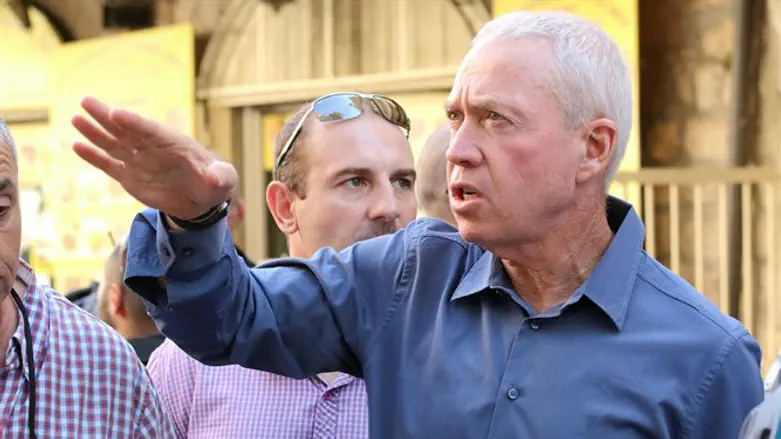
Housing and Construction Minister Maj. Gen. (res.) Yoav Galant spoke Thursday at a conference on the urban renewal of construction Jerusalem.
"These days, we are shortening construction time from the planning stage to 25 percent occupancy," Galant said. "Three years ago, when I took up the job, the average construction process took 15 years, seven years for planning and the rest for implementation. We are currently leading a series of decisions and moves aimed at streamlining and shortening construction time in Israel."
"We at the Housing and Construction Ministry have set up a command and control center that at any given time can tell us where every construction project stands with the click of a button," he added. "I have invited you to the city of Harish to see the realization of the 'plan and build' project, which significantly shortens the planning and construction of new neighborhoods. In addition, in recent months we have signed an agreement with the National Institute for Building Research, which is currently working on the development of 11 advanced construction methods designed to speed up the building process in the field."
Galant said that he opposed the increasing of the size of Israel's cities. "The State of Israel is a small country, 27,000 square kilometers in all, and the open areas must remain for agriculture, recreation and certain places for IDF training. Therefore, we cannot enlarge the cities. Take the city of Jerusalem, for example. There are less than a million people in the city, 8-9 people per dunam. Anywhere else in the world that would not be considered a crowded city. We really need to take whole quarters like Gonen and Katamon and turn them into something that looks different - everyone remembers what it looked like 20-30 years ago."
Galant said that he sees urban renewal as the answer to ensuring that "the most neglected and problematic neighborhoods in the city centers will become attractive places in the next 15-20 years. And the reason is simple: these neighborhoods are located in city centers and their land value has the greatest potential. The first buildings were built some 100 years ago, and there is no way they will continue to stand in such a situation as they are now. Yad Eliahu, the Shapira neighborhood in Tel Aviv or the Hadar and Katamon neighborhoods in Jerusalem - their all neighborhoods which are 70 to 100 years old and which are found in the city centers, and they cannot continue to exist in their present state."
"The problem is that 50 percent of those who are registered in the affordable housing project are couples aged 35 and over with three children," he said, adding: "Today these are people who would have needed to own an apartment already for 10 years. Therefore, we are now implementing the "price-of-living" plan, closing gaps that have been created for 20 years. It takes time but we'll reach the goal."
Referring to the "Arrow to the South" program presented this week, Minister Galant said: "The State of Israel is based on three principles that appear in the Declaration of Independence: equality of rights, democracy and a Jewish state. This means that the only national state that can exist in Israel is the Zionist state. Those who want to establish a sub-state - it cannot be in our home. With the support of hostile elements from the southern Hevron hills and the support of Arab MKs, there has been a process of Islamization that begins from the Judean fortresses through the Bedouin towns to the Dimona crater. This reality contradicts the national vision and I am not willing to give up our hold on the land. It can not be that in the 21st century, only 100,000 Jews will live south of Be'er Sheva. If fifty years ago we would not have established communities like Dimona, Yeruham and Ofakim, we would not have had a Zionist hold in the Negev today."